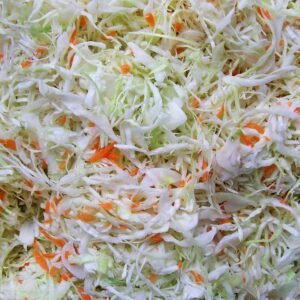Sauerkraut is a popular and delicious fermented cabbage dish that has been enjoyed for centuries. It is packed with probiotics, vitamins, and minerals that have numerous health benefits for humans. But what about our furry friends? Is sauerkraut safe for dogs to eat?
The short answer is yes, sauerkraut can be safe for dogs to eat in moderation. However, there are a few things to consider before giving your dog this tangy treat. Let’s take a closer look at the benefits and potential risks of feeding sauerkraut to your dog.
Benefits of Sauerkraut for Dogs
One of the main reasons why sauerkraut can be beneficial for dogs is its probiotic content. Probiotics are live bacteria and yeasts that are good for your dog’s digestive system. They help maintain a healthy gut flora and can aid in digestion, improve stool quality, and boost the immune system.
Additionally, sauerkraut is a good source of vitamins C and K, as well as minerals like calcium, magnesium, and potassium. These nutrients can help support your dog’s overall health and well-being.
Furthermore, sauerkraut can be a good option for dogs with digestive issues, such as diarrhea or constipation. The fermented cabbage can help regulate bowel movements and promote a healthy gut environment.
Risks of Sauerkraut for Dogs
While sauerkraut can have some benefits for dogs, there are also some risks that pet owners should be aware of. One of the main concerns is the high sodium content of sauerkraut. Too much salt can be harmful to dogs and can lead to dehydration, kidney problems, and other health issues.
To avoid these risks, it is important to choose a low-sodium or sodium-free sauerkraut when feeding it to your dog. You can also rinse the sauerkraut before giving it to your dog to remove some of the excess salt.
Another potential risk of feeding sauerkraut to dogs is the presence of onions or garlic in some recipes. Both of these ingredients can be toxic to dogs and should be avoided. Make sure to read the label carefully and choose a sauerkraut that does not contain any harmful ingredients.
How to Feed Sauerkraut to Your Dog
If you decide to give sauerkraut to your dog, it is important to introduce it gradually into their diet. Start with a small amount and monitor your dog for any signs of digestive upset, such as vomiting or diarrhea. If your dog tolerates the sauerkraut well, you can gradually increase the amount over time.
You can serve sauerkraut to your dog as a topping for their regular food, as a treat, or mixed in with other fruits and vegetables. Be sure to choose plain sauerkraut without any added sugar, spices, or preservatives.
It is also important to consult with your veterinarian before adding sauerkraut to your dog’s diet, especially if they have any underlying health conditions or dietary restrictions. Your vet can provide guidance on the appropriate amount and frequency of sauerkraut for your dog.
In conclusion, sauerkraut can be safe for dogs to eat in moderation. It can provide some health benefits, such as probiotics, vitamins, and minerals. However, it is important to be aware of the potential risks, such as high sodium content and toxic ingredients. If you decide to feed sauerkraut to your dog, choose a low-sodium option without any harmful ingredients and introduce it gradually into their diet. Always consult with your veterinarian before making any changes to your dog’s diet.



